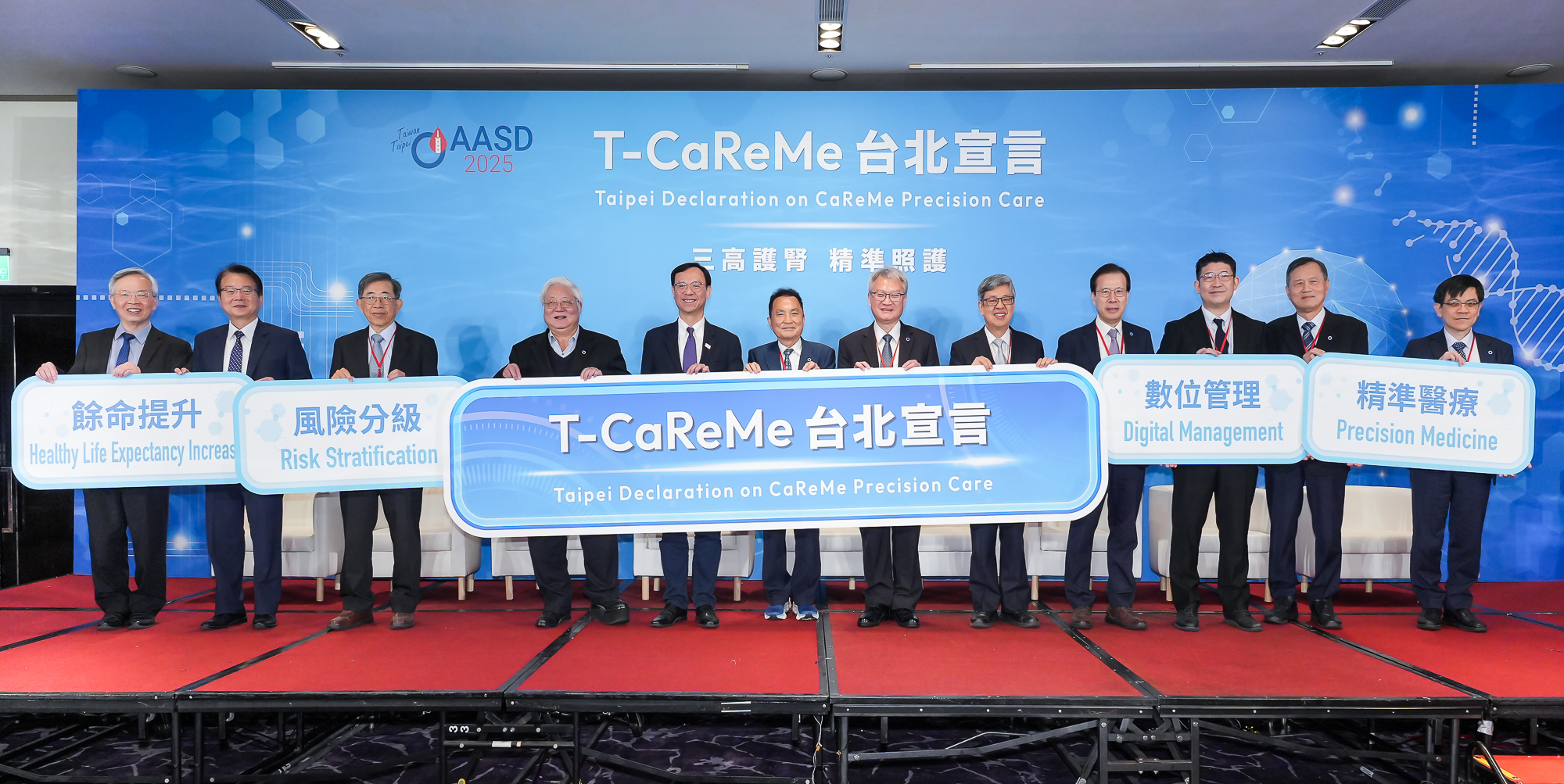Diabetes Association Unveils T-CaReMe Taipei Declaration at the Asia Diabetes International Conference
In an effort to achieve a target of 80% of patients controlling the three highs and protecting kidney health within eight years, Taiwan leads the international trend of precise prevention with public-private collaboration in response to the new health goals of Healthy Taiwan.
TAIPEI, TAIWAN - Media OutReach Newswire - 28 March 2025 - As the global aging process accelerates, the prevention and care of chronic diseases have become a top priority for countries worldwide. The Taiwanese government has actively responded to international trends by promoting the "Healthy Taiwan" policy and launching the "Three Highs Prevention 888 Plan." At the third "Healthy Taiwan Promotion Committee" meeting held last month, new goals were announced to reduce the standardized mortality rate of chronic diseases related to the three highs by one-third by 2030, aiming to strengthen chronic disease prevention and control measures through public-private collaboration. In alignment with the vision of "Healthy Taiwan" and the 888 Plan, and connecting with the international trend of "precision prevention" of chronic disease management, the Taiwan Diabetes Association formally presented the "T-CaReMe Precision Care Taipei Declaration" at the Asia Diabetes International Conference.
With a comprehensive national health insurance system in place, Taiwan ensures that every high-risk group can receive proactive prevention and personalized management early on, demonstrating international competitiveness in the accessibility and completeness of chronic disease care. To address the increasingly severe challenge of chronic diseases—particularly hypertension, hyperlipidemia, diabetes (the three highs), and chronic kidney disease—the Taiwan Diabetes Association unveiled the "T-CaReMe Precision Care Taipei Declaration" at the 17th Scientific Meeting of the Asian Association for the Study of Diabetes (AASD). This declaration was made in witness of various governmental agencies, academic institutions, and medical associations, including the Asian Association for the Study of Diabetes, the National Health Insurance Administration, the Health Promotion Administration, Academia Sinica, the National Health Research Institutes, the Taiwan Society of Nephrology, and the Taiwan Society of Cardiology. The declaration responds to the government's vision of "Healthy Taiwan" and the goals of the 888 Plan, which focus on delaying disability and increasing life expectancy. It proposes a comprehensive health care model for chronic diseases centered around risk stratification, precision medicine, and digital management, further promoting the integration of holistic health care and medical services, while fostering interdisciplinary collaboration to drive a new paradigm of chronic disease prevention and treatment.

New Health Goals for Healthy Taiwan: Reduce Standardized Mortality Rate of Chronic Diseases Related to the Three Highs by One-Third
The Taiwan Diabetes Association Unveils T-CaReMe Declaration to Promote Precision Care Blueprint for Kidney Health in Relation to the Three Highs
With the trends of aging, prolonged illness, and the emergence of chronic diseases at younger ages, chronic disease prevention and management have become a global focus. Taiwan is following international trends by establishing the "Healthy Taiwan Promotion Committee," which has set two major health goals for the next eight years: to increase the average life expectancy of the population from 79 to 82 years and to reduce the proportion of unhealthy life expectancy from 10% to 8%. To strengthen chronic disease management, the government recently announced a target at the Healthy Taiwan Promotion Committee meeting to "reduce the standardized mortality rate of chronic diseases related to the three highs by one-third by 2030," along with comprehensive strategies promoting healthy lifestyles, obesity prevention, and holistic management of chronic diseases, through public-private collaboration to enhance health policies and reduce the risks of chronic diseases and disabilities.
The Taiwan Diabetes Association has released the "T-CaReMe Precision Care Taipei Declaration," making "Kidney Protection in Relation to the Three Highs" a core focus. Through the T-CaReMe initiative, the vision of "risk stratification, precision medicine, digital management, and increased life expectancy" is implemented, along with five key action frameworks: promoting precise risk diagnostics, standardized clinical guidelines, personalized health management, data sharing, and interdisciplinary collaboration. The goal is to ensure that 80% of patients with the three highs and kidney disease achieve control of blood glucose, blood pressure, and blood lipids while ensuring that 80% of kidney disease patients receive care and medication guidance from care managers, thereby enhancing survival rates and improving health quality, creating a stronger defense for chronic disease care in the population.
Risk Stratification × Precision Medicine: T-CaReMe Initiative Launches a New Future for Chronic Disease Management
International Experts Gather to Establish Taiwan as a Demonstration Base for Chronic Disease Care
The T-CaReMe Taipei Declaration focuses on precise risk diagnostic classification and assessment, aiming to accurately identify high-risk populations and improve the effectiveness of chronic disease management. Through expert consensus and clinical risk stratification, as well as medical guidelines, the initiative integrates clinical data with international standards to ensure that patients receive personalized health management and appropriate treatment. Additionally, the declaration emphasizes collaboration across nations and disciplines, engaging in precision medicine and research achievements in the realm of chronic diseases in the Asia-Pacific region, influencing public health policies and improving chronic disease care outcomes, while developing a more precise and accessible holistic health care approach, solidifying Taiwan's position as a regional demonstration base.
The meeting brought together experts and scholars from the National Health Insurance Administration, the Health Promotion Administration, Academia Sinica, and the National Health Research Institutes, along with representatives from the International Diabetes Federation (IDF-WPR) and the Asian Association for the Study of Diabetes (AASD), to witness the official launch of the "T-CaReMe Precision Care Taipei Declaration." The Taiwan Diabetes Association stated that the declaration not only lays the groundwork for Taiwan's development blueprint in precision chronic disease care and kidney health management related to the three highs but also aims to promote upgrades in chronic disease management models, enhance interdisciplinary collaboration, and build a more comprehensive health care system, driving improvements in global chronic disease care quality and prosperity starting from Taiwan.
Dr. Wu Mai-Su, President of the Taiwan Society of Nephrology, noted that although Taiwan has developed risk stratification and data-driven personalized treatment, standardized guidelines have yet to be incorporated, and clinical applications still have room for improvement, especially in the integrated management of kidney disease and diabetes. He expressed that through the T-CaReMe initiative, interdisciplinary collaboration can facilitate the integration of chronic kidney disease risk and comorbid management with diabetes and hypertension, contributing to higher patient survival rates and better kidney function maintenance. Dr. Li Yi-Heng, President of the Taiwan Society of Cardiology, emphasized that risk stratification and data-driven personalized management can effectively reduce the incidence of cardiovascular events, further strengthening the health defenses of the population. Dr. Hsu Hui-Heng, Deputy Director of the National Health Research Institutes, stated that the application of precision medicine will play a crucial role in future chronic disease management. The National Health Research Institutes is actively exploring several initiatives, such as using AI technology and big data to establish smart risk prediction systems, believing that under the visionary actions of the T-CaReMe initiative, there will be further optimization of precise predictions for cardiovascular, kidney, and metabolic disease risks, providing better scientific bases for the prevention of primary and secondary complications and organ damage associated with chronic diseases, thus realizing Taiwan's health blueprint.
Aligning with International Standards! T-CaReMe Initiative Promotes a New Paradigm of Precision Chronic Disease Management
Taiwan will construct a comorbidity risk database within two years. The T-CaReMe initiative calls on all sectors to build a defense against chronic diseases.
In recent years, the Health Promotion Administration has actively promoted the "Scientific Disease Calculation Center" and risk prediction tools to enhance public health literacy and self-management awareness, delaying the onset of chronic diseases through proactive health education. Meanwhile, the National Health Insurance Administration has introduced AI risk stratification tools and a tiered care system, promoting the "Everyone's Health Platform" and comprehensive, patient-centered care to improve care efficiency and resource utilization. Professor Chen Chih-Hong, Vice Convener of the Healthy Taiwan Promotion Committee, stated that the T-CaReMe initiative aligns closely with government policies integrating prevention and treatment, reflecting the core spirit advocated by the 888 Plan. In the future, it is hoped that all sectors will work together to deepen interdisciplinary collaboration and public-private integration, creating a sustainable and resilient model for chronic disease care.
The global healthcare community has identified precise risk assessment and personalized treatment as key trends in chronic disease management. The latest diabetes care guidelines particularly address the comorbidity risks associated with the three highs and kidney disease, suggesting earlier intervention in cardiovascular and kidney health management and enhancing data-driven diagnostic models. The importance of early screening and treatment is emphasized, and precise risk assessment and integration of patient data will be core development directions for future chronic disease management. These international trends indicate that global chronic disease management is moving towards precision medicine, digital monitoring, and interdisciplinary integration, which aligns closely with the goals of the T-CaReMe initiative.
The Taiwan Diabetes Association took action as early as 2023, collaborating with 12 medical institutions in Taiwan to join the iCaReMe global registry program. Through interdisciplinary integrated care, patient tracking, and the application of clinical data, it not only provides more precise risk assessments and patient profiles but also effectively monitors and optimizes treatment outcomes, which has been shown to improve patients' health conditions. Chairman Huang Jian-Ning shared that the short-term goal of the T-CaReMe initiative is to construct a representative database within two years. By analyzing lifestyle factors, it aims to more accurately assess the comorbidity risks of different patients. Implementing a comprehensive model for precision chronic disease care requires not only efforts from the medical community but also active participation from government agencies, academic institutions, industry partners, and civic groups to jointly promote data integration and personalized health management, ensuring that risk stratification and standardized guidelines are continually refined, while enhancing chronic disease management effectiveness in Taiwan and the Asia-Pacific region.
Yutaka Seino, Chair of the Asian Association for the Study of Diabetes conference, stated that Taiwan has consistently been at the forefront of chronic disease prevention and treatment in Asia, and he hopes that through public-private collaboration and interdisciplinary cooperation, Taiwan can lead the global improvement of chronic disease care quality.
Hashtag: #DiabetesAssociation
The issuer is solely responsible for the content of this announcement.

















